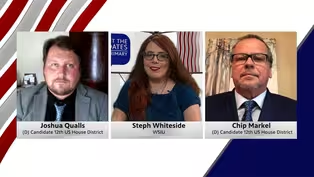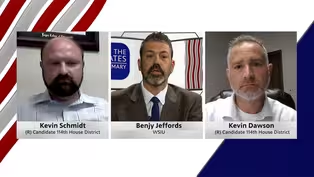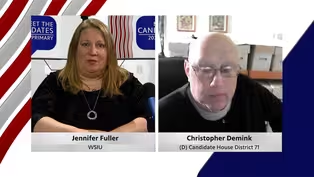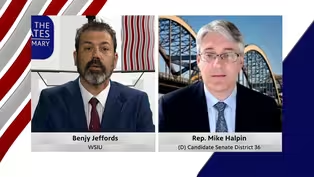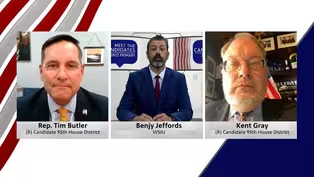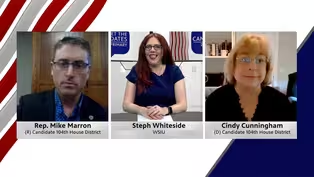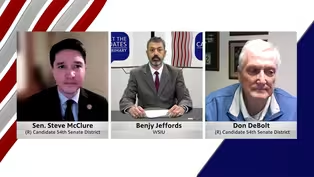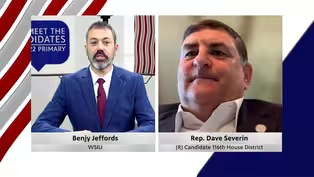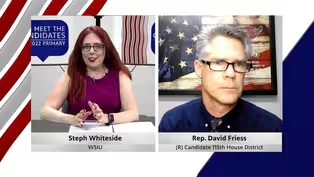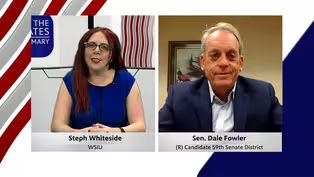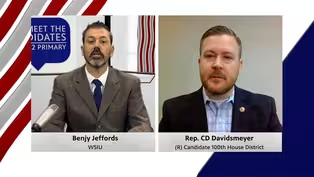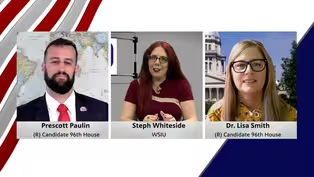Meet the Candidates
48th Illinois Senate District Primary Democrat Candidates
5/12/2022 | 26m 46sVideo has Closed Captions
48th Illinois Senate District Primary Democrat Candidates forum.
Meet the Candidates interviews candidate (D) Sen. Doris Turner for the 48th District of the Illinois Senate.
Problems playing video? | Closed Captioning Feedback
Problems playing video? | Closed Captioning Feedback
Meet the Candidates is a local public television program presented by WSIU
This series is produced in partnership with the League of Women Voters
Meet the Candidates
48th Illinois Senate District Primary Democrat Candidates
5/12/2022 | 26m 46sVideo has Closed Captions
Meet the Candidates interviews candidate (D) Sen. Doris Turner for the 48th District of the Illinois Senate.
Problems playing video? | Closed Captioning Feedback
How to Watch Meet the Candidates
Meet the Candidates is available to stream on pbs.org and the free PBS App, available on iPhone, Apple TV, Android TV, Android smartphones, Amazon Fire TV, Amazon Fire Tablet, Roku, Samsung Smart TV, and Vizio.
Providing Support for PBS.org
Learn Moreabout PBS online sponsorshipMore from This Collection
Meet the Candidates features interviews with candidates running for Illinois state, House and Senate races. Guests will discuss key issues impacting Illinois voters such as the economy, the environment, education and public health. This series is produced in partnership with the League of Women Voters.
12th U.S. Congressional Seat Primary Candidate Forum
Video has Closed Captions
Joshua Qualls and Chip Markel, running for the 12th U.S. Congressional Seat. (25m 21s)
114th Illinois House District Primary Candidate Forum
Video has Closed Captions
Dr. Kevin Schmidt and Kevin Dawson, running for the 114th House District. (25m 57s)
71st House District Primary Candidate
Video has Closed Captions
Ahead of the June primary, WSIU talked with Christopher Demink, running for the 71st House (21m 35s)
36th Senate District Primary Candidate Forum
Video has Closed Captions
WSIU talked with 36th Senate District candidate Representative Mike Halpin. (26m 29s)
95th Illinois House District Primary Republican Candidates
Video has Closed Captions
Representative Tim Butler and Kent Gray, running for the 95th House District. (26m 58s)
104th Illinois House District Primary Candidates
Video has Closed Captions
104th House District candidates Representative (R) Mike Marron and (D) Cindy Cunningham. (26m 49s)
54th Illinois Senate District Primary Republican Candidates
Video has Closed Captions
54th Illinois Senate District Primary Republican Candidates forum. (25m)
116th Illinois House District Primary Republican Candidates
Video has Closed Captions
116th Illinois House District Primary Republican Candidates forum. (25m 9s)
115th Illinois House District Primary Republican Candidates
Video has Closed Captions
115th Illinois House District Primary Republican Candidates forum. (23m 14s)
59th Illinois Senate District Primary Republican Candidate
Video has Closed Captions
WSIU interviews Senator Dale Fowler from the 59th Senate District. (27m 29s)
100th Illinois House District Primary Republican Candidates
Video has Closed Captions
WSIU interviews candidate C.D. Davidsmeyer, running for the 100th House seat. (26m 9s)
96th Illinois House District Primary Republican Candidates
Video has Closed Captions
Candidates Prescott Paulin and Dr. Lisa Smith, running for the 96th House seat. (28m 45s)
Providing Support for PBS.org
Learn Moreabout PBS online sponsorship(upbeat music) (camera beeping) (upbeat music continues) (bright music) - This is "Meet the Candidates" and we are here with Senator Doris Turner from the 48th Senate District.
I'm Steph Whiteside.
WSIU Public Broadcasting and the League of Women Voters are pleased to host today's forum.
Representative Sandy Hamilton, who is also running for this seat, declined our invitation to participate today.
Thank you so much for joining us today Senator Turner.
- Thank you for the opportunity.
I always think that it's great whenever I have the opportunity to talk about the 48th and the great things that we're doing here.
- All right, let's get started.
So what is your number one priority if elected?
I know it can be really hard to narrow it down, but please try to just stick to one for now.
- Okay, well, I think that I bring a great perspective to this district because I've lived here my whole life.
It's where I grew up, where I raised my family and now where I'm seeing my grandchildren thrive.
So I think that what I'm interested in doing is working very closely with all the stakeholders in the district and continuing to work on building economic development and strengthening our workforce.
Because I really think that when we have a strong workforce, it brings a diverse economy and that helps the entire district as well as the entire state.
- So, what makes you an effective lawmaker and would continue to make you an effective lawmaker if you're reelected?
- I've had the opportunity to work in different areas of government.
I served 10 years on the Sangamon County Board, nine and a half years on the Springfield City Council, and then transitioned to the Illinois State Senate where I've been for a little over a year and a half.
And one of the things that has always propelled me to be successful in any of those elective offices, is my ability to work across the aisle in a bipartisan manner.
When I was on the Sangamon County Board, I was in this significant minority party, but I got a lot of things done because I understand that we need to work together in order to benefit our district.
And that's what I bring to this.
As a matter of fact, in my short time in the Senate, I was able to move about nine or 10 bills to the governor's desk for signature.
And each one of those bills went to his desk with bipartisan support.
And I'm really proud of that.
And I think that that's where my strength lies and that's where I have the ability to bring so many different resources back to this district.
- The pandemic really exposed disparities in education funding.
What would you do to make sure schools in your district are able to meet the needs of families and students?
- You know you're right.
The international pandemic really did shine a light on a lot of the disparities throughout a number of our different systems.
And education was certainly one of them.
I had the opportunity to look at this from a municipal perspective while I was on the Springfield City Council and then on a statewide perspective.
And I think that in each one of these areas, what we really tried to do was to provide additional funding to buttress our public education systems.
And if you look at the budget that I advocated for and that recently passed and the governor signed, you'll see a significant increase in funding for pre-K through higher education, which is extremely important.
The other thing that we found was that, there was a significant shortage of teachers that was also creating even a greater problem.
And I was able to stand with the governor and some of our educational leaders on last Tuesday when he signed a package of bills, that I was the chief sponsor on one, and the co-sponsor on the other three that will significantly impact our education system and get more teachers in the classroom.
I also worked with Eastern Illinois University and Decatur Public School District to create a pipeline for teachers to go into the district with the Grow Your Own initiative that was fully funded for four years.
That at the end of that four years, we will see a significant number of teachers in those classrooms.
And those are the things that I think we have to continue to do.
I'm a big advocate of working with our local stakeholders in order for them to let us know what we need to do, and then putting all of my efforts towards making sure that we have the appropriate funding and the appropriate energy behind them to get those things done.
- Well, this definitely won't be the last time the pandemic comes up, but let's shift gears for a minute to something else you mentioned, which is the state budget.
It's a major priority in Springfield.
So name three things that you would prioritize in the budget.
- Again, that's difficult to just stick with just three, but I think that when you look at the budget, the three things that I would say were really important is that, it really did put more money in the pockets of middle class individuals.
And I think that that's extremely important.
When you look at the relief that was provided through issues around property taxes, issues around grocery tax and the gas tax, that will provide a significant amount of money that is kept in everybody's pocket, which is extremely important.
There's also funding that was in there for workforce development.
And I think that I mentioned that before and how important it is that we have those middle class jobs that not only help our economic landscape in our state right now, but it also brings more people into our state and which will look at how we can increase that tax base and be able to do more things.
And then of course, I always go back to education and the education funding that was in the budget.
I began my public advocacy, volunteering in my kids schools long before I even dreamed of being an elected official.
And so public education is extremely important to me.
And I think that the significant (indistinct) that we put on public education in the budget is extremely important and will definitely pay big dividends.
I always say that education is the foundation on which communities are built.
And in order for us to grow our states, we have to continue to invest in education.
- And now that we've talked about your budget priorities, what are three things that you would cut?
- That's another, you're asking very difficult questions, but whenever lawmakers are asked that question, they always pivot to talking about cutting waste.
And there really is not a lot of waste in the budget.
So I don't wanna use that standard stock answer.
I think what we really need to do is continue to examine and review our programs and our priorities and make sure that we are doing a deep dive on a data-driven evaluation to make sure that the programs that we are funding and that we are putting into place are being effective.
And so I think that we really need to do that on an ongoing basis.
And just because something is a priority for us in one year, doesn't necessarily mean that it continues to be a priority.
And perhaps the programs that we put in place are working and our data-driven evaluations will show that, and we need to move on to something else, or they may show that they're not working in the way that we have instituted them.
And we need to go back to the drawing board and look at doing something a little bit differently.
So I think that that's what we really need to do is continue to work on doing that data-driven evaluation so that we understand exactly where we are in the efficiency of our budget priorities and programs.
- Thank you.
Although the economy is recovering from the early stages of the pandemic, inflation is also on the rise, what would you do to help Illinoisans who are finding their paychecks don't stretch as far as they did even a couple of months ago?
- I think that there are a lot of reasons why we're seeing inflation on the rise.
Some of it is from an international perspective that locally, we don't have a lot of input on, but when we look at those international issues that are coming up, I think that what I would continue to do is work very closely and in partnership with our federal delegation and make sure that they understand the priorities of our district and that I always wanna know what I can do on the local level to be of assistance to them as they're trying to tackle these things from a national level, because I think that that's very, very, very important.
I think that we also continue to look at the things that we can do here locally to make sure that we are able to put more money in the pockets of the individuals who are here.
Is very difficult and I can speak to it from a personal perspective that, it seems like our money is not stretching as far as it used to.
But some of the things that we are looking at in terms of the property tax relief and the gas tax relief and the grocery tax relief, will definitely be helpful.
The other thing that we look at with things that will have an immediate effect, is we also did a moratorium on some taxes that would be able to have individuals that have school children.
Now, one of the big things that we always have to think about when we have children that are in school, along about August and September, you're trying to get all your kids back in school.
So you're buying school clothes, you're buying school supplies.
You're looking at more money for school lunches and those kinds of things.
And so there is priorities that were placed in the budget that will provide some relief for those individuals that are looking to get their kids back in school.
So those are awesome, real common sense kinds of things that will provide a refund and cheques that you can actually deposit in the bank.
But also those things that we will see have an incremental impact when we go to the grocery store, when we go to fill up our cars, and also when we have to pay those property tax bills.
- All right.
So many people are pushing for more renewable energy, especially with the rising price of oil.
At the same time, parts of Illinois have fossil fuel supplies that could provide energy for many years to come.
What would you do to ensure Illinois has a steady supply of energy and keep it affordable for Illinoisans?
- I look at this from a very personal perspective.
As I mentioned, I served on the Springfield City Council for nine and a half years, and we have a municipally-owned power plant here, City Water, Light & Power plant.
And so when I was involved in the negotiations around the energy bill that we passed during the last session, that came up a lot because not only does it provide energy, but it also provides a significant number of jobs in this community.
And it's something that we definitely had to look at.
So I think that we need to do what I talked about a lot during that whole energy dialogue was that, we have to look at how we diversify our set of energy options.
I supported the energy legislation so that no area of the district would find themselves susceptible to rolling blackouts like we saw in Texas.
That was so detrimental to those communities in that state.
And we don't wanna see anything like that happen in Illinois.
So I do think that we have to look at how we diversify our energy options and also make sure that there's money in the budget for a huge carbon capture project that will go a long way to having us look at how we approach our energy options for years to come.
This is something that's very new, it's been talked about for a number of years, but we're actually now moving from that dialogue and talking about a phase to actually how we move it into actual operation.
So there's gonna be a learning curve for all of us.
And I think that we really need to make sure that that diversity of options is on our plate and that we move at a slow pace so that we don't get ahead of ourselves and have some consequences that we may not be in a position to take care of.
- And going back to the pandemic for a minute, COVID-19 really changed the way people look at healthcare and public health.
What would you do to make sure Illinois is prepared to handle future public health emergencies?
- I retired from the Illinois Department of Public Health after 22 years as the chief of the Center for Minority Health Services.
So I probably looked at the pandemic through a different kind of lens than maybe some other lawmakers.
I think that one of the things that we did very effectively during the pandemic and actually continuing is that, we incorporated strong educational messages into almost everything that we did.
And we made those messages in a way that people could understand them.
And we made them very applicable to everyone's everyday life.
And we're continuing to do that.
And I think that that's extremely important.
And I think that a lot of those messages that we put out there are things that people incorporated into their daily lives and those won't go away.
Those will definitely stay there.
The other thing that we did was to fund support for our first responders and our healthcare workers.
And those are things that will stay and will definitely not go away.
When I talked a little bit before about the light that was shined on a lot of the disparities in a lot of our systems, one of those was also, you know, we talked about how we had to go to doing everything virtually, and that was a shock to everybody, but it also took us to a place that we have probably not been before.
We had been using our social media as a means of sharing pictures of kids and grandkids and TikTok and all of those kind of fun things, but we saw how it had to be more functional.
And so we really look at how we put more money towards broadband and ensuring that every part of our state would be able to function on a level playing field with everyone else.
So I think that we did incorporate a lot of things that are gonna stay, that won't go away and that's a great thing.
- Thank you.
And another issue facing the state is gun violence.
It continues to be a problem for communities across the state.
What would you do to address the violence and how do you balance that with Second Amendment rights?
- Of course, I support the Second Amendment, that goes without saying.
So what I will tell you is some of the things that I have done.
I have approached the issue of gun violence that we're seeing a uptick on throughout the entire state of Illinois.
And unfortunately, the 48th District, that did not pass over us.
So we did see that uptick in several of our communities as well.
And I have actually approached it from a dual perspective, one of a crime reduction and violence prevention.
So I have met with most of the mayors and police chiefs in the district and talked to them about the issues that they're seeing and what we could do from a legislative perspective in order to address those.
So I was really boots on the ground.
I didn't wanna sit in an office and try to say, "This is what I think should happen."
I wanted to talk to those individuals that were actually on the ground so I could hear from them.
So I did a couple of things in response to that.
I put money in the budget for a new Illinois State Police cadet class, which will put more law enforcement individuals on our streets in order to support those municipalities.
The other thing that I did was work to put funding in the budget that will trickle down to our communities that have been hardest hit that will provide funding for those crime reduction and violence prevention programs that will be instituted in partnership with those local not-for-profits that really have their ear to the ground and can work very closely with our communities.
'Cause I think those are things are very important, that it's important to have that partnership.
It's not all crime reduction, locking up everybody.
It has to be a partnership with the crime reduction as well as the violence prevention.
- Well, and you talk about crime reduction, criminal justice reform is aha topic in Springfield.
Do you support changes to the system, including alternative sentencing options like drug courts, and what changes would you make to ensure safety while also making sure that rehabilitation remains an option?
- Again, I go back to that word, "Partnership," because I think it's extremely important.
I think that we have to work in partnership with all of the stakeholders that are involved in our criminal justice system.
I actually sit on the board of the Sangamon County Drug Court.
So I have seen from a very close view how important those types of alternatives are to our community.
The Sangamon County Drug Court has been extremely, extremely, extremely successful and has actually looked at moving that and increasing that and going into other similar types of courts that provide that alternative to sentencing.
And I think that we have to really look at doing more of that.
As a matter of fact, we've seen how successful those are.
And in District 186, one of our high schools has instituted a similar type of referral court.
So it is a great option and we've seen how successful those options are.
And I would continue to work in partnership with our local law enforcement, our judicial system, as well as all of those not-for-profit organizations and educational organizations that are seeing how, this uptake in violence is permeating throughout our community and what we can all do working in partnership in order to see that decline and move us to where we can have safer communities.
I think that's what we all want.
We all want our communities to be safe.
I don't think we'll ever go back to, the way it was in the fifties where things were very open, but we do wanna get to a place where our communities are much safer than they are right now.
- Recent events like the pandemic and fighting in Ukraine have shown how much Americans can be impacted by global politics with things like supply chain shortages and rising prices.
What would you do to try and help minimize the disruption of events like these on the people of Illinois?
- I think it goes back again to the great working relationship and partnership that I have with our federal delegation.
Because as you mentioned, these are a lot of national and international issues.
While they have a tremendous impact on us locally, they are ones that we have to work on at a national and federal level.
And that's what I would continue to do.
I think that when we talk about our supply chain issues, though, it really goes back to what I said a little bit earlier about doing what we can to buttress our workforce and our workforce development, which will lead to more economic development for our district.
I think that when we can look at how we can have that diverse workforce that will bring a diverse economic development to our district, and perhaps bring some of those companies and businesses to our district and to Illinois, where we will have a lot of those things that we're looking for and that we're having issues with, built in Illinois, we won't have those supply chain issues.
So, I think that we have to look at it from a dual perspective, working with our federal delegation to address the things that are happening now, but also to look at what we can do to provide that economic development in Illinois so that we can have a lot of those things built here.
And we see that coming actually now with the chips for the electric vehicles that are coming to Illinois.
So we're working on it and I think we're gonna get there.
- All right, well, this is gonna be our last question for today.
So what would you do and what have you done to make sure that the concerns of your constituents are being heard in Springfield, considering the population density skews toward the Northern part of the state?
- I think that sometimes our perception may not necessarily be our reality.
I know that people talk a lot about, all of the attention is on Chicago and Chicago gets everything, but that has really not been my experience while I've been in the Illinois State Senate.
I belong to five different caucuses in the Senate.
And in each one of those caucuses, my voice is very loud, very clear, and our voices are heard.
And I think that if you look at the resources that I have been able to bring back to this district, that has definitely been born out.
And I will continue to do that.
So I think that we have to identify our priorities.
We have to identify the things that we want, and then we have to be a very loud cheerleader for them.
And that's what I will continue to do as the Illinois State Senator for District 48.
- Well, thank you so much for joining us today, Senator.
- Thank you again for the opportunity.
- And thank all of you for tuning in for "Meet the Candidates" for Senate District 48 with Senator Doris Turner.
Tune in next Thursday at 7:00 PM for more.
For WSIU, I'm Steph Whiteside.
(bright music)

- News and Public Affairs

Top journalists deliver compelling original analysis of the hour's headlines.

- News and Public Affairs

FRONTLINE is investigative journalism that questions, explains and changes our world.












Support for PBS provided by:
Meet the Candidates is a local public television program presented by WSIU
This series is produced in partnership with the League of Women Voters

